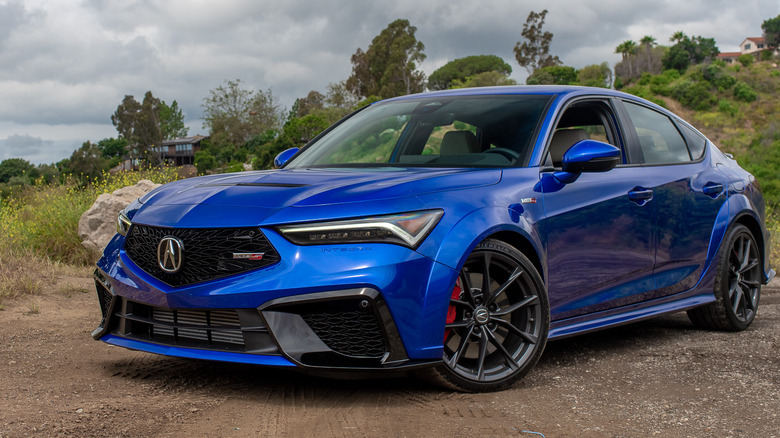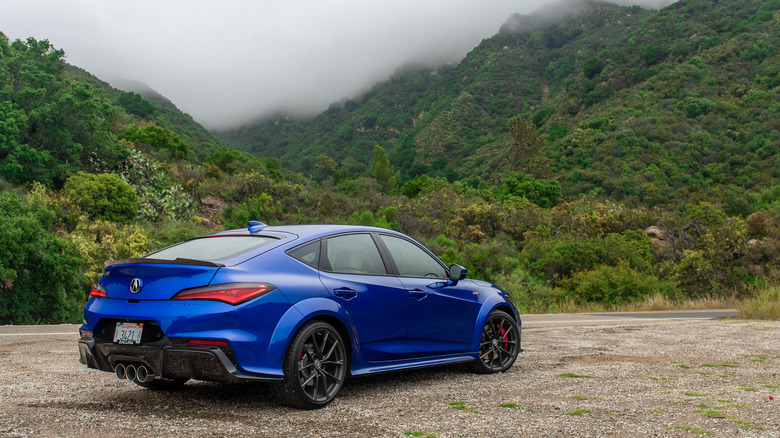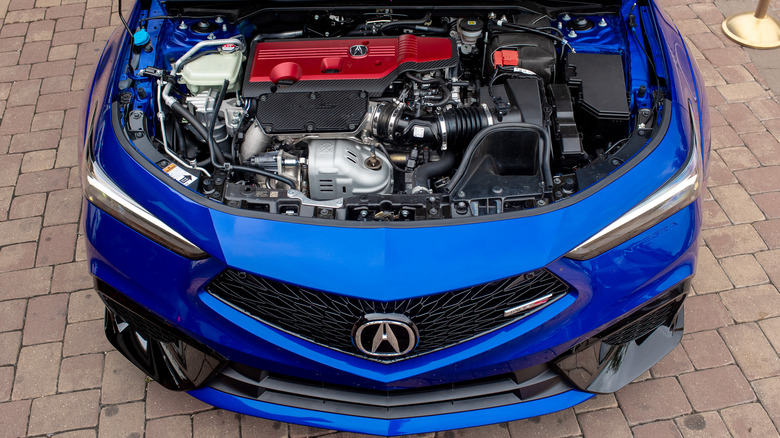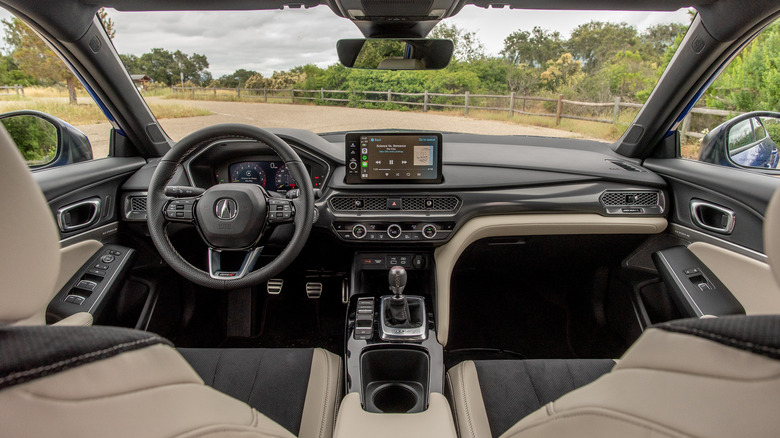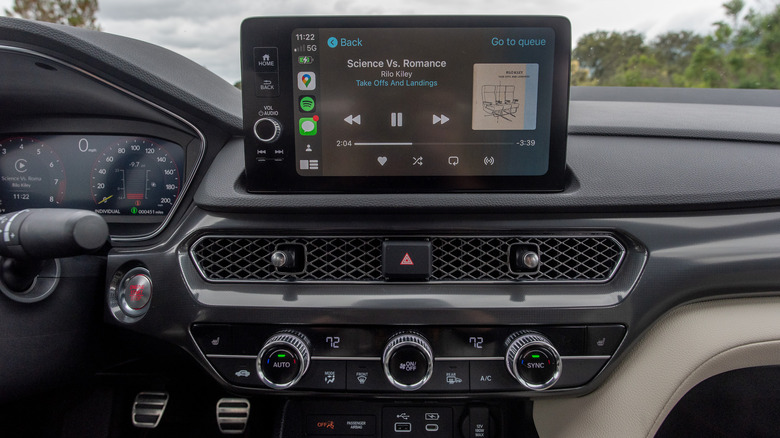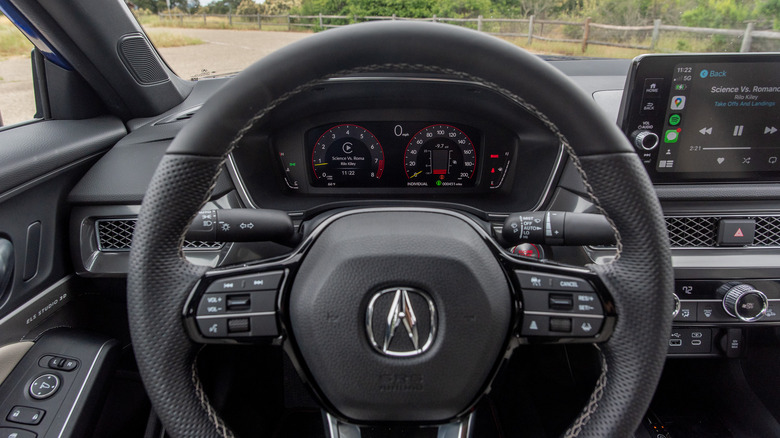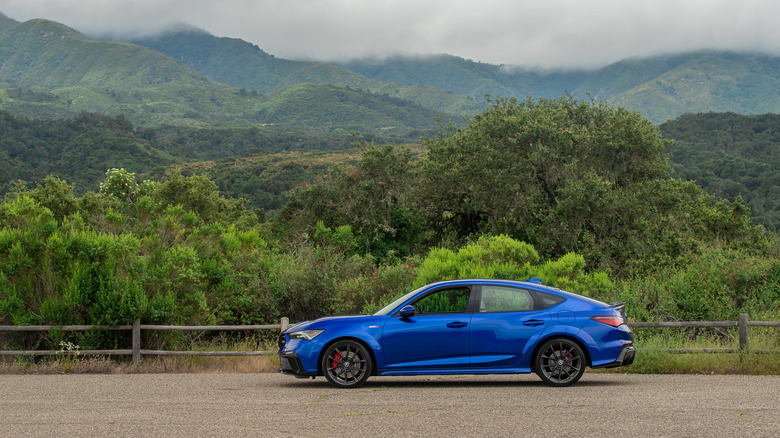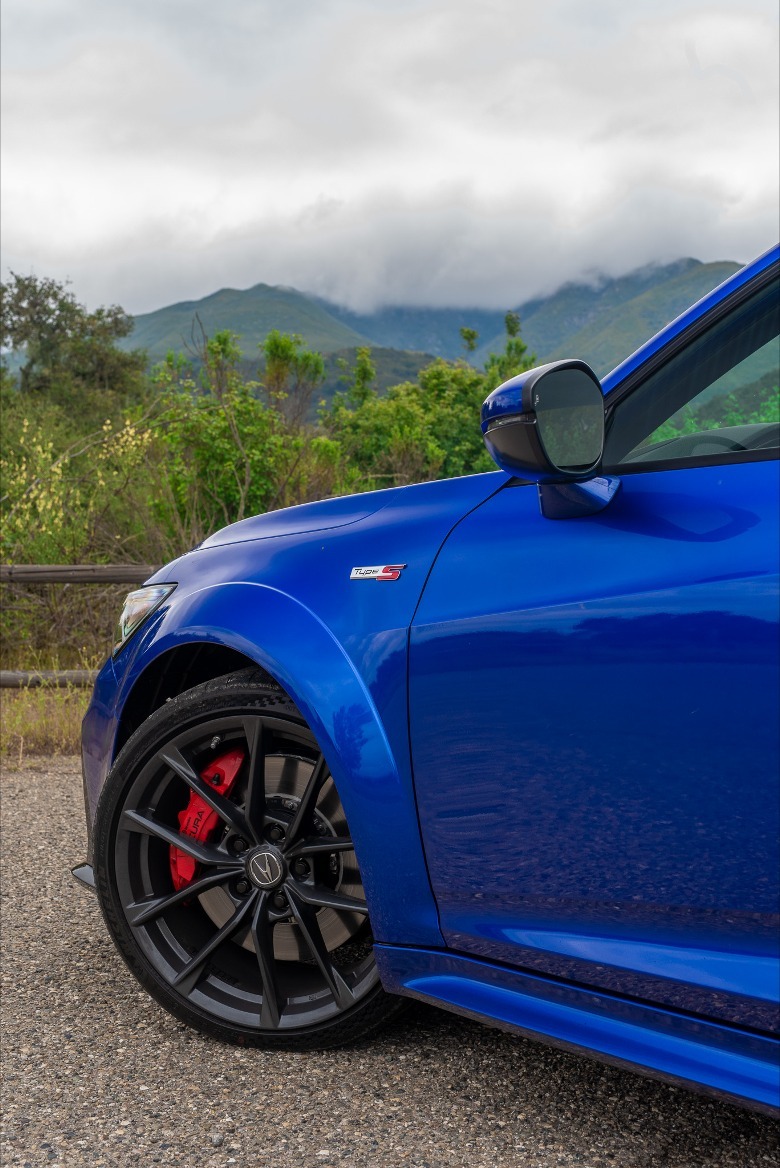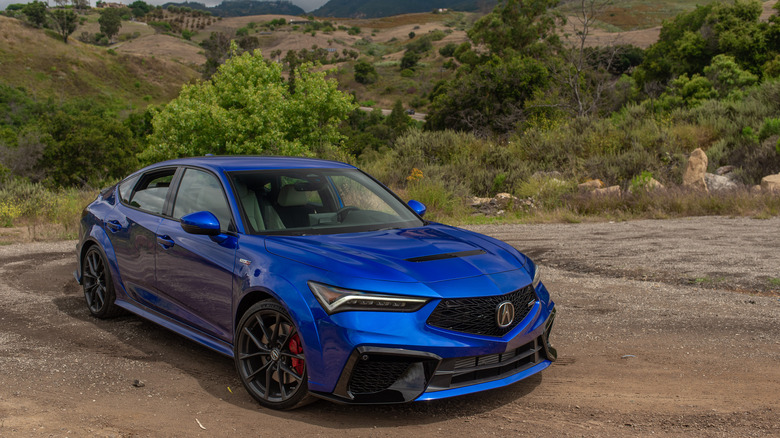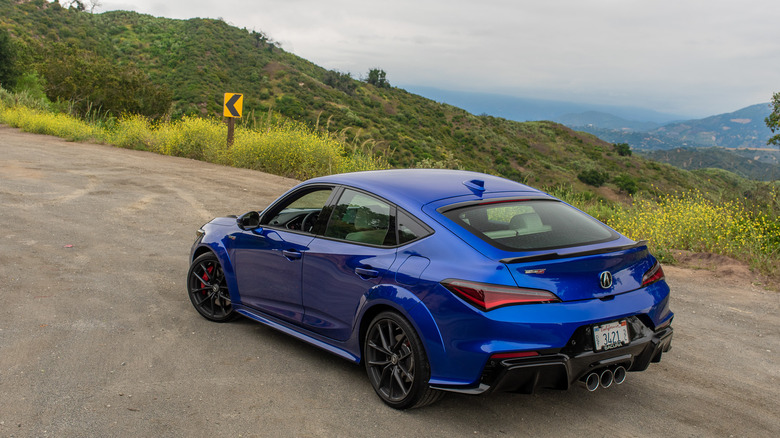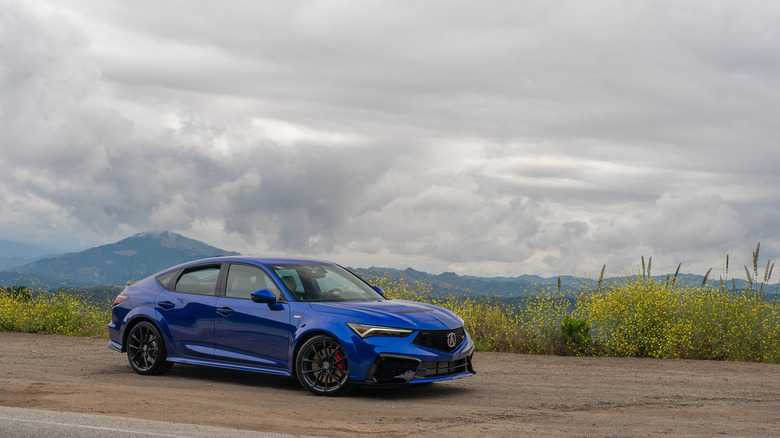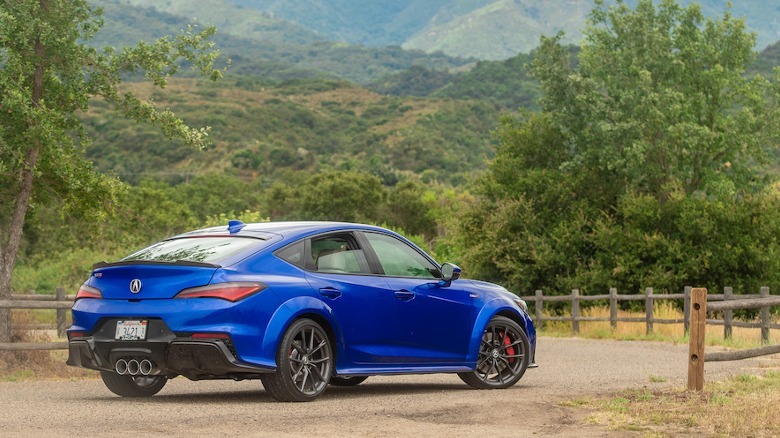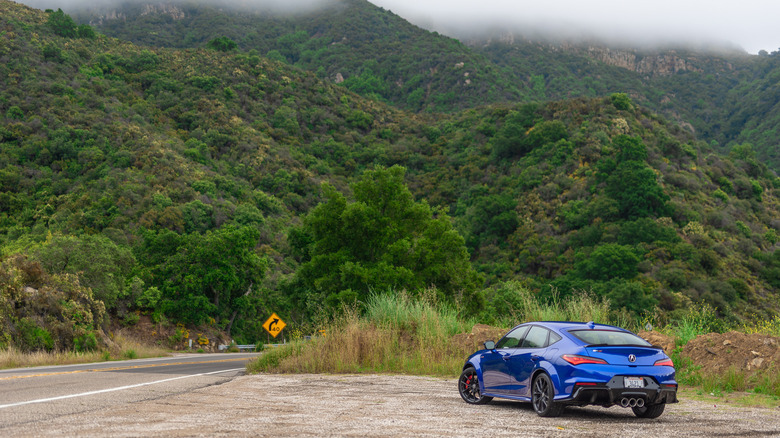2024 Acura Integra Type S First Drive: A Gift To Enthusiasts
There is a depressing inevitability to being a young auto writer. It's an interesting job, but it feels as though the golden era is already behind me, and I was simply born too late to experience it. Manual transmissions are almost dead, cars are heavier with every passing year, and the joy of driving will assuredly dwindle away with new model releases until every vehicle on the road is some form of an electric toaster. The old guard tells me about the days when the cars they tested—now-legendary models fetching mid-high five figures on Bring a Trailer, you know the ones—stirred the soul. I was simply too late, and soon, I will solely have the toasters on wheels to review.
The 2024 Acura Integra Type S is the antidote to my millennial doom. This car reminded me why I picked up a pen and jumped in the driver's seat to begin with: it is single-handedly its own golden era on four wheels. This car keeps the visceral driver's machine alive for one more generation of enthusiasts—mine. If it truly is the last hurrah for the joy of analog motoring, as it might be, I'm finally satisfied. I couldn't imagine a better send-off than this.
You Just Gotta Drive It
I must stress this isn't solely due to its drivetrain. The hot-hatch is based on the same base ingredients as the '23 Honda Civic Type R, with the same 2.0-liter turbo-four. The Type S puts out five more horsepower than the Civic—320 vs the Type R's 315—and the same amount of torque, at 310 pound-feet. This is channeled through the same six-speed manual transmission—no automatic available on the Type S—to the front wheels.
This similarity has led to grumbling, as the Civic is indisputably the track-readier choice—and the Honda stickers for roughly $7,000 less than the Acura, which comes in at five bucks shy of $52,000 after destination fees.
For roads, not paper
The general consensus from the automotive community has been that heated seats and leather are not worth the $7,000 upcharge. The competitive set at the $50K price point also encompasses quite a few heavy hitters, from the luxury-focused BMW M240i and Audi S3 to sporting legends like the Toyota Supra, Volkswagen Golf R, and Nissan Z. All of these cars offer some sort of statistical prowess that seems to obsolete the Type S before it's had a chance to leave the showroom floor.
But cars are driven on roads, not on paper. To understand why this car sparked my love for driving anew, you just gotta drive it.
Luxurious trappings
My test loop for the Integra Type S was a winding series of tight mountain roads in the hills around Santa Barbara, California. Before I got to those, I had to take a quick jaunt through the sleepy town of Ojai, which showcased all the luxury car must-haves the Type S possesses—with the car dialed to "Comfort" mode, it's relatively sedate inside, although the 9-inch-wide wheels and Michelin Pilot Sport 4S's pick up a bit of road noise.
Still, the adaptive suspension doesn't crash over hard bumps when in its softest setting, and the seats—heated leather, with 12-way electric adjustment—lend themselves to a much more relaxed atmosphere than the hard-core Civic Type R. They're focused on comfort ahead of aggressive bolstering, which I would expect from an Acura.
The right amount of tech
The tech stack all works well, too. The latest iteration of AcuraWatch, Acura's driver-assistance package, comes standard with every safety feature expected of a luxury car: lane keep detection and assistance, traffic-sign recognition, adaptive cruise, and pre-collision detection with cross-traffic monitoring. The adaptive cruise is much improved over older Honda/Acura versions, and lane keep assist is smooth, with no ping-ponging between the lines.
A little Honda in the mix
The UI features a 10.2-inch digital gauge cluster with a choice of three different faces, and a standard heads-up display. The cabin is simple, but attractive—although I wish the upper dash plastics were a little less Honda, and a little more Acura—but features physical controls for climate and stereo volume paired with a 9-inch touchscreen with characteristically Acura-like unobtrusive and easy-to-reach placement. Wireless CarPlay and Android Auto are standard, and your tunes blast through a 16-speaker, 530-watt ELS Studio system, which bumps hard.
The interior works for a luxury car; it would be hard to believe it shares the bones of a Type R in relaxed city driving if you didn't know better.
High-performance heart
But that was the boring part of the story. The town of Ojai finally faded into my rear-view mirror and it was time to shed the refinement. I put the car into "Individual" mode, which lets you customize which settings you want—my choices were Sport+ steering, exhaust, and UI, with Comfort suspension, because these roads weren't the smoothest—and tore into the empty hairpin curves ahead.
The Type S, which had been a competent luxury car up 'til this point, became a riot.
First corner—90 degree left-hander—third gear, and wow, turn-in is fantastic. Honda and Acura have been on a roll with steering feel for ages—it's one of my favorite parts about the base-model Integra, too—and it's characteristically fantastic here. There's a sharp feel and light weight on center that progressively tightens and weights through a corner in a way that tells you how hard you're really pushing through resistance and feedback, instead of numbly getting you up to the limit, and then dropping you off of it. It doesn't require being driven at the limit to feel engaging, but it works well all the way to it.
Not built for lap times, and that's a good thing
Corner exit, still in third, 2.0L turbo right around 2,800 RPM now as I face a long straightaway, roll onto the throttle, and wow, the engineers were not ashamed this car was turbocharged. Torque comes on hard right around 3,200-3,4000 RPM. It's so much better for it.
Every modern turbo car I've driven—Golf R, GR Supra, M cars, name it—prioritizes smooth, quick spool to redline, usually at higher RPMs. Smooth is fast; that's how you deliver lap times. The Type S does not care about your lap times. It delivers a nineties-turbo-car style gut punch of torque. I test it in fourth gear, too—it feels the same there, like a wave of power that comes over the whole cabin. I love it.
Truly mechanical
Tight right-hander, downhill, heavy on the brakes, and wow, they bite hard. Up front they're 13.8 inch discs with four-piston Brembos, and in Ojai, I had forgotten this fact, because they're fairly sedate. Stomp on them into a corner, though, and you'll remember real quick. I back off to get a feel for the pedal, and it graduates smoothly to the force I want. I aim the car easily through the corner thanks to the fantastically thin A-pillars.
Downshift as I enter into second gear—the car rev-matches automatically, a welcome occurrence because the pedal box is too wide for me to effectively heel-toe—and the transmission feels sublime. It's on the notchy side, but not in a plasticky, arcade-shifter-like way; it connects gears with certainty. It feels truly mechanical.
Let the wheels have their say
Stomp the throttle coming out of the right-hand turn, right in the center of the tach where the torque is on tap, and the 265-millimeter-wide fronts and helical limited slip work in concert to produce positive torque pulling the Type S out of the corner. Torque steer is usually uttered as a dirty phrase, but here, it works in concert with me and the car. I can get on the gas way sooner and I know exactly where I'm aiming.
I slam the gearbox into third. With the windows down, much too loud to hear whatever piped-in sounds the cabin offers, I hear the car utter genuine pops and crackles from the tri-tip exhaust behind me as the revs climb. I cackle with it.
There are still twenty miles of undulating twisting raucous hairpin corners ahead of me and I am already having the best first drive of my life.
This Is A Public Service Announcement
I ended up taking forty-something miles of the finest roads Southern California has to offer, and it spurred joy in me that none of its competitors have been able to. Sure, the Golf R/S3 have all-wheel-drive, and the M240i has more power, and the Supra is a fastback coupe, but they do not make me feel like this; no matter how vividly I try to describe this drive, the most important part is that I had fun in a way that cars rarely offer anymore.
This fun is why the Type S is not a simulacra of old performance cars, developed in a lab to evoke feelings of nostalgia for bygone experiences. It is the old-school performance car. This is the fun we missed, and it is coming back for a final bow. This drive will be my old-timer story in the business; when the fresh young writers come in on the electric toaster drives, I'll tell them they just don't make cars like they used to. I'll tell them about the time I drove the Type S. I'll tell them how it made me remember why I love to drive.
